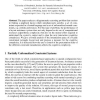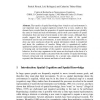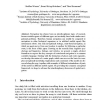161
click to vote
SPATIALCOGNITION
2000
Springer
15 years 5 months ago
2000
Springer
The paper analyzes a diagrammatic reasoning problem that consists in finding a graphical layout which simultaneously satisfies a set of constraints expressed in a formal language a...
SPATIALCOGNITION
2000
Springer
15 years 5 months ago
2000
Springer
Possible influences of contexts on memory for routes are investigated. Route knowledge was established by learning a route which was presented on a computer screen. Activation of k...
SPATIALCOGNITION
2000
Springer
15 years 5 months ago
2000
Springer
109
click to vote
SPATIALCOGNITION
2000
Springer
15 years 5 months ago
2000
Springer
We present an approach to spatial inference which is based on the procedural semantics of spatial relations. In contrast to qualitative reasoning, we do not use discrete symbolic m...
117
click to vote
SPATIALCOGNITION
2000
Springer
15 years 5 months ago
2000
Springer
The transfer of spatial knowledge from virtual to real environments is one important issue in spatial cognition research. Up to now, studies in this domain have revealed that the p...
130
click to vote
SPATIALCOGNITION
2000
Springer
15 years 5 months ago
2000
Springer
An approach to high-level interaction with autonomous robots by means of schematic maps is outlined. Schematic maps are knowledge representation structures to encode qualitative s...
117
click to vote
SPATIALCOGNITION
2000
Springer
15 years 5 months ago
2000
Springer
Memory representations of spatial information require the choice of one or more reference systems to specify spatial relations. In two experiments we investigated the role of diffe...
121
click to vote
SPATIALCOGNITION
2000
Springer
15 years 5 months ago
2000
Springer
Navigation has always been an interdisciplinary topic of research, because mobile agents of different types are inevitably faced with similar navigational problems. Therefore, huma...
126
click to vote
SPATIALCOGNITION
2000
Springer
15 years 5 months ago
2000
Springer
Since humans usually prefer to communicate in qualitative and not in quantitative categories, qualitative spatial representations are of great importance interfaces of systems that...
141
click to vote
SPATIALCOGNITION
2000
Springer
15 years 5 months ago
2000
Springer
This work is about the integration of the skills robot control, landmark recognition, and qualitative reasoning in a single autonomous mobile system. It deals with the transfer of ...



